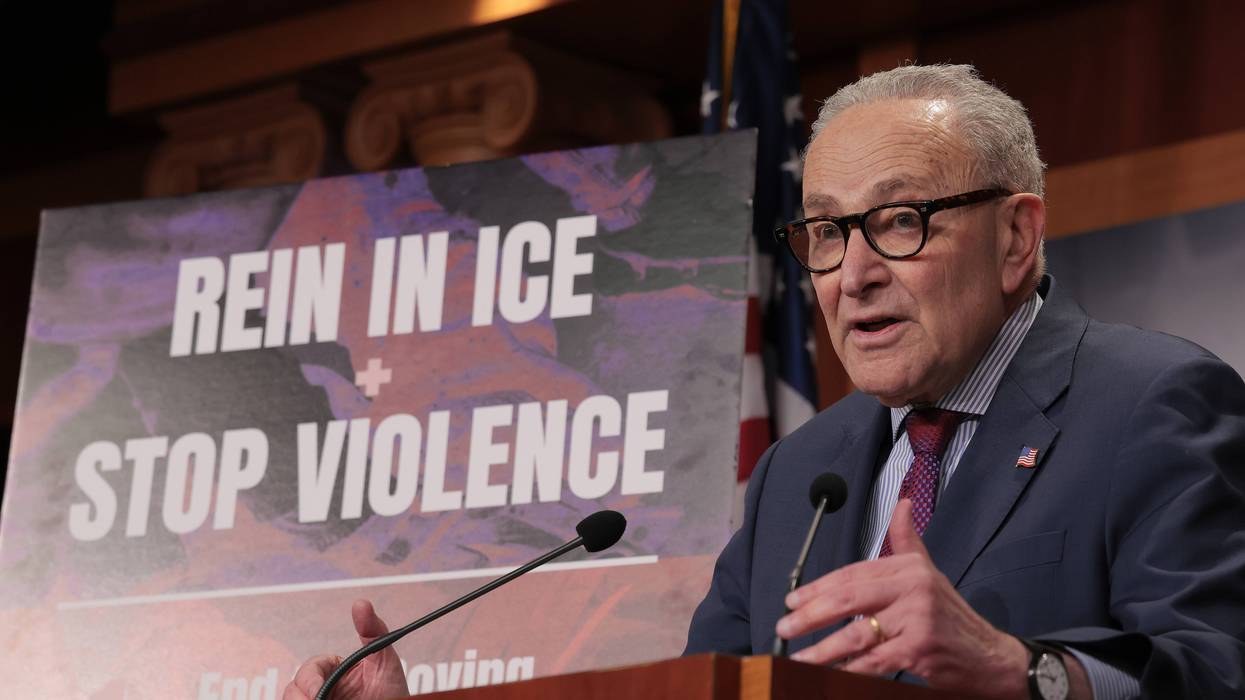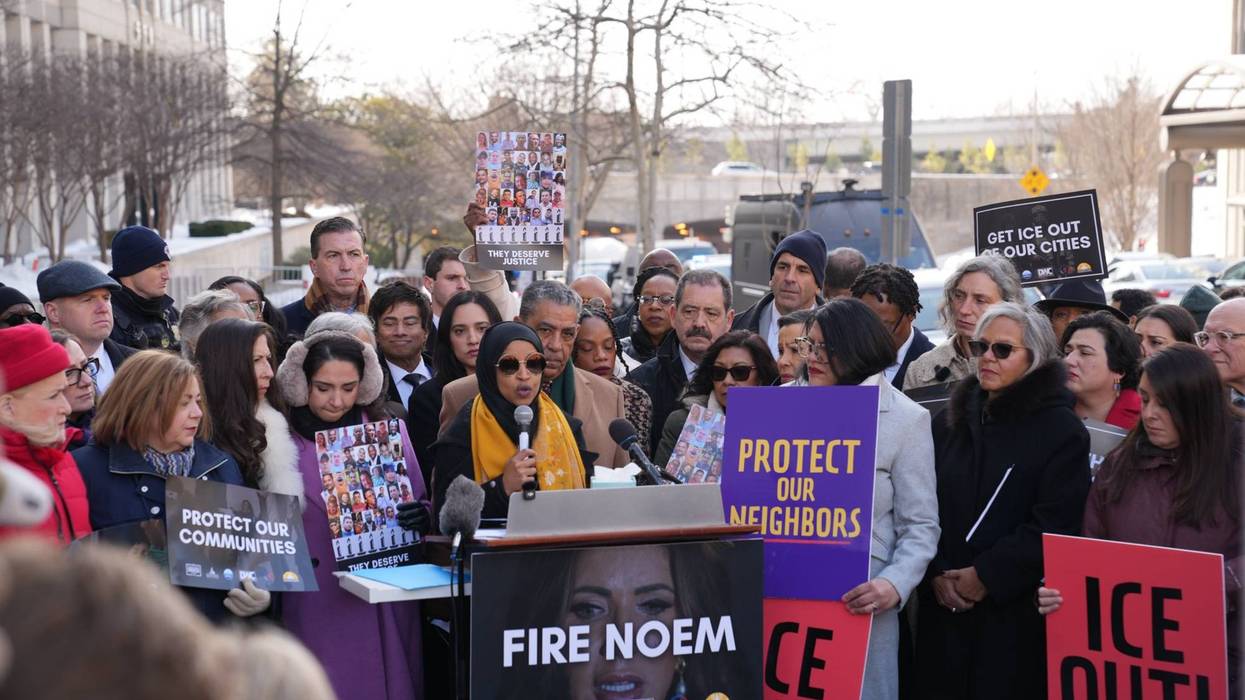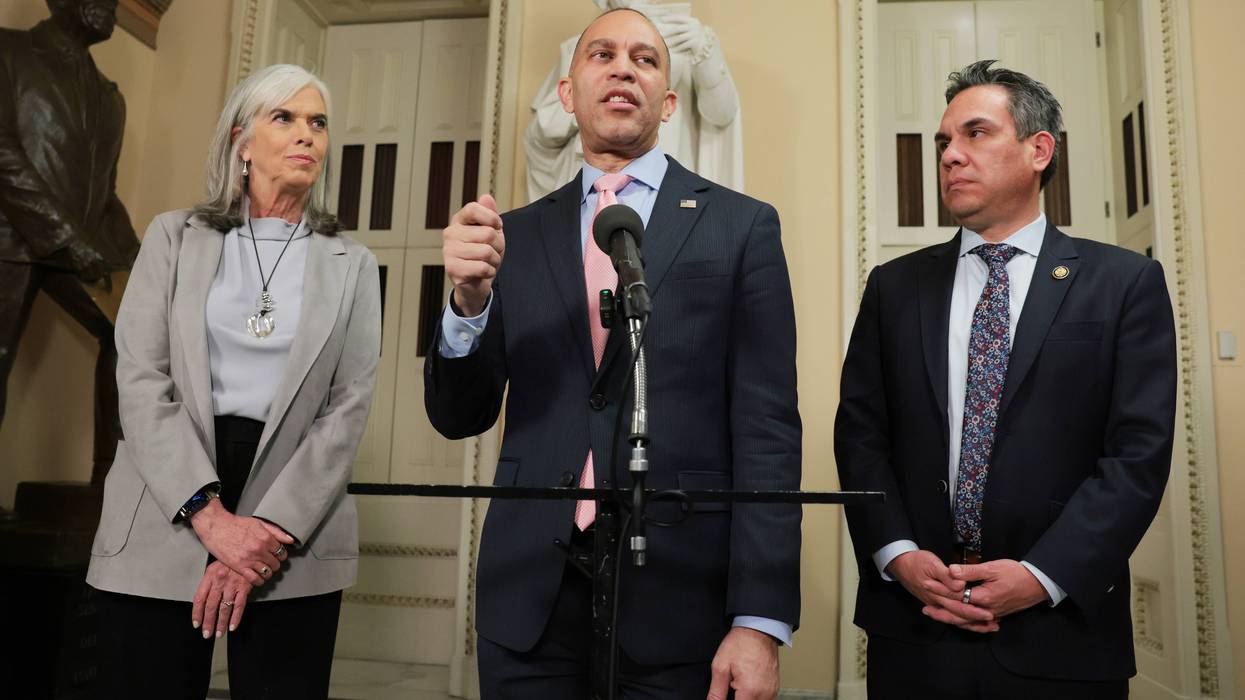However, as David Dayen explained on Wednesday for the American Prospect, the bill "falls short of imposing true accountability on ICE in the wake of the murder of Renee Good in Minneapolis."
It “flat-funds” ICE at current levels for the fiscal year, although in real terms it’s an increase to the budget, because the previous year included a one-time “anomaly” of additional spending. It restricts spending on detention that could theoretically lower capacity to 41,500 beds from a proposed 50,000. And there are some limitations on what DHS can shift from other agencies into ICE. But because the bill includes no penalties or enforcing mechanisms to ensure that its funding directives are actually adhered to, these funding boundaries are not terribly meaningful.
Democratic lawmakers forced other “guardrails” into the bill, like funding for oversight of detention facilities and mandatory body cameras for ICE agents. And additional training is mandated for agents who interact with the public. But other measures, like blocking the detention and deportation of U.S. citizens or borrowing enforcement personnel from other agencies, weren’t added to the bill. And the funding, once again, is not guaranteed, given that the Trump administration has routinely withheld or shifted around funding without pushback from Congress.
Rep. Rosa DeLauro (D-Conn.), the ranking Democrat on the House Appropriations Committee, who served as the chief negotiator for the bill, has struggled to defend it in the face of reports that ICE is abducting young children, harassing and detaining US citizens, and has been directed to break into homes without a warrant in violation of the Fourth Amendment as a matter of policy.
“It is complicated,” DeLauro admitted during a meeting of the House Rules Committee, “when you’re both trying to govern, and you’re trying to resist what may be infringements, to thread that needle and try to be able to move forward.”
However, heading into Thursday's vote, she has maintained that a government shutdown affecting other critical agencies would be more damaging.
“I understand that many of my Democratic colleagues may be dissatisfied with any bill that funds ICE,” she said. “I share their frustration with the out-of-control agency. I encourage my colleagues to review the bill and determine what is best for their constituents and communities.”
Sen. Chris Murphy (D-Conn.), who has been one of Congress' most outspoken opponents of the bill from the beginning, said that while he understands his colleagues' objections, he believes that "the political police force Trump is building at DHS—and their daily violation of the law—threatens to unwind our republic."
"It's not just Minnesota. DHS is ignoring the law everywhere," he wrote in a lengthy post on social media. "I'm just back from Texas, where DHS is thumbing their nose at the law, disappearing legal residents and kids. Why? Because there are no consequences, they think they will get a bipartisan vote to fund their illegality."
He said Democrats should be demanding more for their votes, including "stopping DHS from moving personnel—e.g. [Customs and Border Protection]—out of their budgeted missions; requiring warrants for arrests; restoring training and identification protocols." While he acknowledged that the party “had a hard job,” he said, “there are no meaningful new restraints in this bill.”
Rep. Jim Himes (D-Conn.) joined in, saying, "I will not facilitate the lawlessness of an agency that is murdering young mothers, threatening peaceful protestors with assault rifles, and kidnapping elderly Americans out of their homes."
Rep. Ro Khanna (D-Calif.), who said he was "leading the opposition" to the bill, explained in a video posted to social media that "the ICE budget under [former President Joe Biden] was $10 billion a year. Donald Trump's Big Ugly Bill increased it by $18 billion a year for the next four years. Today, they want to memorialize that and triple ICE's budget."
"No Democrat should vote yes on this bill," he continued. "Frankly, we need to tear down the ICE agency and have a new federal agency to enforce immigration law under the Justice Department."
Acknowledging that there is not yet sufficient support on Capitol Hill to outright abolish or defund the agency, the Congressional Progressive Caucus (CPC) has also called for blocking the funds and introduced its own legislation that would limit the use of force by agents.
According to the Guardian, the majority of the 213 Democratic members of the House are expected to vote against the funding bill. But for it to stand any chance of being blocked, total party unity would be necessary, and some of the 218 Republicans would either need to defect or fail to show up for the vote.
Jeffries has personally stated that he will vote against the bill, and according to two congressional sources who spoke to the Prospect, has "recommended" that other members vote against it. However, the party whip, Rep. Katherine Clark (D-Mass.) and her deputies have not been directed to bring the rest of the caucus into line with that position.
In a statement issued Thursday, Jeffries, Clark, and Democratic Caucus Chair Pete Aguilar (D-Calif.) again said they personally planned to vote no on the appropriations bill but gave no guidance to their colleagues.
A source tracking the legislation on Capitol Hill told the Prospect that many Democrats in swing districts are planning to vote for the legislation because "they’re terrified of being labeled anti-law enforcement" and "want this to go away so they can talk about the cost of living more. Problem is, it’s not going away.”
Their hesitation comes despite public outrage toward ICE reaching an all-time high, with more of the public now wanting to abolish the agency outright than to keep it, according to a poll conducted earlier this month by YouGov.
Murphy has contended that "the public wants us to make a real fight to stop Trump's abuse of power and to restore humanity and legality to ICE operations," adding, "I don't think a no vote would be out of step with the public. In fact, it's what they demand: accountability for what's happening."
New Republic editor Aaron Regunberg echoed this, encouraging Democrats to "pick the goddamn fight!"
"Americans don’t like what ICE is doing," he said. "This is clearly the kind of playing field in which a fight—which drives further attention towards ICE’s abuses—is advantageous.
In a statement to Common Dreams, the progressive political action committee Justice Democrats described Jeffries' refusal to push against the bill as "cowardice in the face of fascism."
"We need a strong, unflinching opposition party that is united against the president’s personal paramilitary force," the group said. "Instead, Jeffries is willing to let multiple Democrats vote with Republicans to pass this funding, funneling even more of our tax dollars into state-sponsored terrorism."




